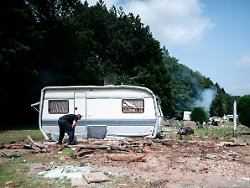Wednesday July 21, 2021
Flood instead of high season
Tourism industry fears for sales
First tourism is suffering from the Corona restrictions, now the flood is thwarting the plans of vacationers in some travel areas. The industry views the current situation with skepticism, but is also spreading confidence. From Bavaria, for example, they say: “You can come!”
Devastated campsites, destroyed holiday homes and hotels, damaged bridges, tracks and roads: the flood disaster, especially in western Germany, is hitting tourism hard in the affected areas. “For the hosts, who have lost their livelihood in the worst case after the long corona lockdown, it is an absolute catastrophe,” reported Michelle Schwefel, branch manager of the German holiday home association. In particular, the regions in rural areas are urgently dependent on tourism. “The full extent of the flood and the effects on tourism cannot be estimated at the moment,” said Schwefel. It is unclear how many accommodation providers are affected by the flood and how many holidaymakers are currently unable to travel. The Vulkaneifel and the Moselle region are popular holiday destinations.
According to the German Hotel and Restaurant Association (Dehoga) in Rhineland-Palatinate, for example, there are virtually no inns or hotels in the badly affected Ahrweiler district that could serve guests again within the next twelve months. “The destroyed infrastructure, the broken buildings but also, for example, the lack of gas supply give little cause for hope,” said Dehoga President Gereon Haumann. Numerous holiday guests would also cancel their bookings in parts of the country that were not affected by the flooding at all, such as Rheinhessen or the Palatinate. “We are assuming that thousands of beds will remain empty despite the high season,” said Haumann. This is due to the fact that the state is viewed as a disaster area as a whole. Even holiday areas along the Moselle are now ready for guests again.
According to initial estimates by the Federal Association of the Camping Industry (BVCD) in Germany, four campsites in North Rhine-Westphalia and eleven in Rhineland-Palatinate are so devastated that they cannot open for an indefinite period. There are more than 3000 campsites nationwide, which usually make around 70 percent of their turnover in the holiday months of July and August. “There is hope that there have been an above-average number of bookings for September so far,” said BVCD managing director Christian Günther. “We see corona catch-up effects.”
River cruises with few restrictions
According to the travel association DRV, the consequences for providers of river cruises are limited. “There weren’t as many cancellations as initially feared,” said Benjamin Krumpen, co-managing director of Phoenix Reisen. “We have to struggle again and again with the consequences of high and low water. The shipping companies can basically deal with them.” Some cruises have had to be canceled, others have had their timetable changed. It is expected that the Danube will be navigable again from Passau at the weekend, as will the Moselle and the entire Rhine route.
It is not currently possible to estimate what effects the catastrophe will have on the overall balance of tourism in Germany. The Baltic and North Sea, which are not affected, as well as Bavaria are traditionally particularly popular with holidaymakers from inland in Germany. Floods and landslides had caused devastation in the Berchtesgardener Land at the weekend. Tourist accommodations were apparently largely spared. “You can arrive!” Writes the Bergerlebnis Berchtesgaden association on its website.
.
